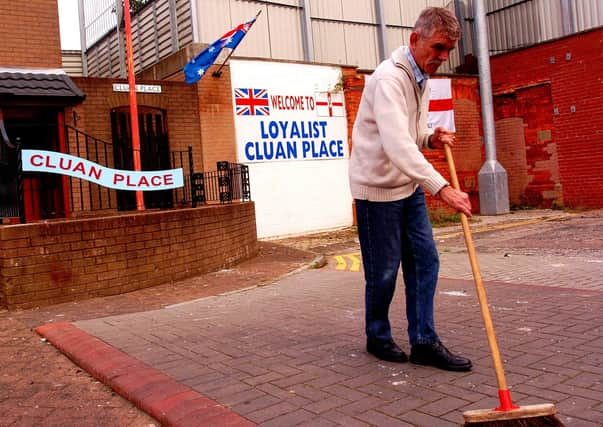Protestants more fearful than Catholics over tearing down ‘peace walls’


That is one of the key findings of a report published by the Department of Justice this week, looking into attitudes towards the barriers which segregate urban neighbourhoods across Ulster.
The report, “Public attitudes to peace walls”, was published this week by the Department of Justice.
Advertisement
Hide AdAdvertisement
Hide AdResearch had been carried out for the project by survey firm Ipsos MORI.
Surveys were sent to a random sample of 8,400 households in Belfast, Londonderry and Portadown, who live within 250 metres (820 feet) of peace walls, between June and August 2019.
In all 1,022 people returned a completed questionnaire.
Similar surveys had been done in 2012 and 2015.
Among the key results were the sometimes stark differences in attitude between Catholics and Protestants in interface areas.
> Almost a third of Protestants (32%) feel there have been no benefits at all in their area from the peace process, which is more than double that of Catholics (15%);
Advertisement
Hide AdAdvertisement
Hide Ad> 63% of Protestant respondents said they “never” or “rarely” interact with people on the other side of their peace wall, compared with 56% of Catholics.
> When asked what they thought of the sentiment “without the peace wall our community would disappear”, 37% of Protestants agreed, compared with just 12% of Catholics.
> 62% of Protestant respondents said it was unrealistic to remove the walls by 2023, compared with 51% of Catholics.
> If the peace walls were removed, 32% of Protestants said this would lead to “constant” sectarian violence and anti-social behaviour, compared with 16% of Catholics.
Advertisement
Hide AdAdvertisement
Hide Ad> If they walls were removed, 59% of Protestants said they would be “worried” the police would not be able to maintain order, compared with 47% of Catholics.
> Perhaps the most striking figure of all was the number of people who say they would leave their homes if the walls came down. In all, 18% of Protestants said they would move house, compared with 8% of Catholics.
Ipsos MORI found that previous research indicates that interface areas in Belfast have been increasingly populated by individuals from a nationalist background, which could be among the factors influencing the results.
> Over time support for removal of the peace walls has remained “relatively stable”, says the report, with 39% stating a preference for their nearest peace wall to remain in place in 2012, compared with 43% in 2015, and 42% in the latest survey.
Advertisement
Hide AdAdvertisement
Hide AdTheir removal has been a long-stated ambition of political leaders.
For instance, in the 2015 ‘Fresh Start’ agreement, the text of the document says that the government “will provide an additional £60m over five years in support of the Executive’s delivery of confidence and relationship building measures within and between communities, contributing to the conditions that will allow the removal of peace walls”.
However, the walls received no mention in the 2020 ‘New Decade, New Approach’ deal.
Click here for more from this reporter on sectarian violence: Newly released confidential file: Catholic Bishop thought Martin McGuinness was chilling, humourless, and violent – but regularly attended mass
Advertisement
Hide AdAdvertisement
Hide AdClick here: Confidential document reveals top Troubles solicitor said Gerry Adams had ‘firm grip’ on the IRA
Click here: John Hume: Loyalist terror boss ‘consulted with Hume twice while drafting UDA political strategy’
Click here: Dying loyalist admits: Yes, I joined the UVF. No, I do not regret it – but I am sorry people died
A message from the Editor:
Advertisement
Hide AdAdvertisement
Hide AdThank you for reading this story on our website. While I have your attention, I also have an important request to make of you.
With the coronavirus lockdown having a major impact on many of our advertisers — and consequently the revenue we receive — we are more reliant than ever on you taking out a digital subscription.
Subscribe to newsletter.co.uk and enjoy unlimited access to the best Northern Ireland and UK news and information online and on our app. With a digital subscription, you can read more than 5 articles, see fewer ads, enjoy faster load times, and get access to exclusive newsletters and content.
Visit https://www.newsletter.co.uk/subscriptions now to sign up.
Advertisement
Hide AdAdvertisement
Hide AdOur journalism costs money and we rely on advertising, print and digital revenues to help to support them. By supporting us, we are able to support you in providing trusted, fact-checked content for this website.
Alistair Bushe
Editor